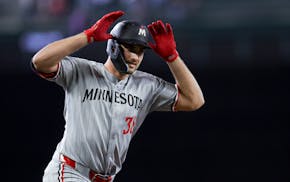When Zach Zenner first was admitted to the Sanford School of Medicine in 2016, he delayed medical school because of an NFL career he wasn't sure would happen.
When he scored in the 96th percentile of the Medical College Admission Test in 2019, he again declined medical school. This time, it was because of a football career that had lasted longer than expected.
The running back from Eagan played five NFL seasons after signing with the Lions as an undrafted free agent out of South Dakota State in 2015, retiring after four years with Detroit and a fifth with the Saints, Cardinals and Dolphins. By that time, he was married with two kids under 18 months old. He prayed about the decision and reached the conclusion he wouldn't go to medical school. His wife, Alyssa, already knew.
"Am I really gonna say, 'OK, see you guys in 10 years?' " Zenner said. "That's kind of the commitment timeline when you're working a job as a doctor. And then I bring that up to my wife, and she goes, 'Of course you're not going to medical school.' "
He would instead use his degrees in biology/pre-med and nutrition as assets in his new career as a sports agent.
Zenner passed the NFL Players Association certification exam in 2021 and took a job with One West Sports Group, which represented him during his playing career. Zenner had done medical research in his offseasons as a player, and his conversations with Lions nutritionist Sarah Snyder turned him on to the idea that medical care could do more than just relieve maladies; it also could be used to optimize athletic performance.
"Most of the health care system is set up to make sick people not sick," Zenner said. "But there's this whole other side. You can be way better than 'not sick.' You can be really lean, really good energy, really sure mentally. There's so much more available to you than just not having symptoms."
While playing for the Lions, he followed Snyder's suggestion he take a mediator release test to identify food sensitivities that might cause allergy or inflammation. He frequently used the cryotherapy machine and light bed in the team facility to help recovery.
The solutions he had found during his NFL career, he realized, could make him a valuable resource for the players he would represent.
"It was like, 'Wow — I'm going to have NFL clients that are going to be interested in this,' " Zenner said. "There's a lot of really neat crossover."
He moved back to the Twin Cities and launched Zion Performance, a Rosemount-based nutrition coaching business he runs in conjunction with his agency work. He keeps space in his schedule to work with 12-15 clients who sign up for his five-month nutrition services. He also partnered with Precision Fuel and Hydration, a British company that helps athletes learn how many electrolytes they lose from sweat.
As a player, Zenner regularly would lose 5 pounds while practicing on a hot day. He took a sweat test where he ran on a treadmill in a sauna, with patches on his arms and an internal thermometer he ingested to make sure he didn't suffer heat stroke. Precision's test, by contrast, collected only a few drops of sweat and delivered results in 45 minutes.
Lexi Kelson, a registered dietitian who works with clients in Atlanta, said the test is the same one used to determine whether an infant has cystic fibrosis. "Sodium chloride ions are the key measurement for cystic fibrosis," she said. "With athletes, we're really just looking at milligrams of sodium."
Zenner runs the only testing center in Minnesota, and he has tested 112 athletes since he bought the machine.
He has used it with football teams before summer camp practices, but many people who bought the $200 test are endurance athletes in search of answers before a long-distance event.
I'm one of them.
Zenner and I first chatted about the sweat test a year ago at the NFL combine in Indianapolis, where I was squeezing in training runs for the Boston Marathon between news conferences. The idea piqued my curiosity, but I had never struggled with dehydration or cramps in more than 25 years of running, so I figured I didn't need to know my sweat metrics.
That all changed April 15, when the hottest Boston Marathon Monday in seven years, combined with the notorious course, took my calves for a ride they'd never experienced. My early pace was too ambitious for the 73-degree weather, and at Mile 16, the cramps in my right calf were so furious I couldn't flex my ankle as I began the descent that follows each of Boston's four famous climbs. I finished almost a half-hour slower than my goal; the week after the NFL draft, I texted Zenner to book a sweat test.
We met at Hope Field House in Rosemount, where I sat in a chair and Zenner strapped a band around my left forearm, with a disc that would deliver an electrical stimulus to activate my sweat glands. A few drops of perspiration spiraled around the tube on the watch-sized disc, mixing with blue dye to make it visible. The test was painless, and a few minutes later, I had my results.
The test showed I was a salty sweater, losing 598 milligrams of sodium for every pound I sweat off. In other words, I'd need to replace that much sodium in every 16 ounces of water I consumed during a marathon. Zenner and I looked up the nutrition labels of the hydration supplement I'd put in my water bottles in Boston; each one had only 40 milligrams of sodium.
We chuckled about the boneheaded hydration strategy, and he emailed me recommendations. I left relatively confident I had an answer for what derailed my marathon, and I shifted my focus to Grandma's Marathon in June, which I'd registered for to rebound from my Boston debacle. I started planning how I'd replace the 2,000-plus milligrams of sodium I'd lose during the race.
I downed 16 ounces of water with a 1,000-mg electrolyte tablet the night before the race and did so again on race day. I stopped for water every 40 minutes or so, taking a 240-mg energy gel and 215-mg electrolyte capsule each time.
The tailwind from Two Harbors to Duluth helped, as did the gentle rain that kept me cool during the race. But I'd never felt as strong in a marathon as I did that Saturday, just 68 days after Boston. I charged through the race with no cramps, ditching my prerace anxiety as I pursued a more aggressive pace than I'd planned. I finished in 2:58:14, more than a minute faster than the personal record I'd set the previous year at Grandma's.
The sweat test, it seemed, had revealed a solution to the problems my Boston burnout exposed. Zenner's first test was on an Ironman triathlete, but he said he bought the machine thinking of former NFL teammates who'd needed IVs after a hot training camp practice.
"And then there's a giant population of players who are just beneath that IV threshold," he said. "There's that group of people I know needs my test."
His post-playing career puts him in a unique position to educate them.
Sports nutrition "was really natural, just with my interests," he said. "But it felt like, if I was going to [become an agent], it would fit really well."
To get exclusive analysis on the Vikings in your inbox, sign up for the free Access Vikings newsletter. Email your Vikings questions to accessvikings@startribune.com.
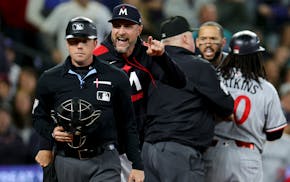
Twins' Correa ejected from on-deck circle, and he's not really sure why
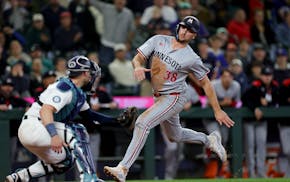
Twins' inability to score in extra innings costly in wild loss at Seattle
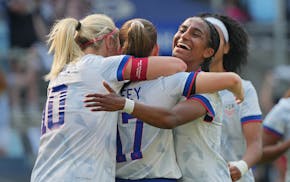
USWNT shuts out China 3-0 at Allianz Field
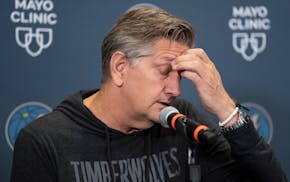
Analysis: The Wolves' offseason, broken down for easy consumption of a complicated topic
